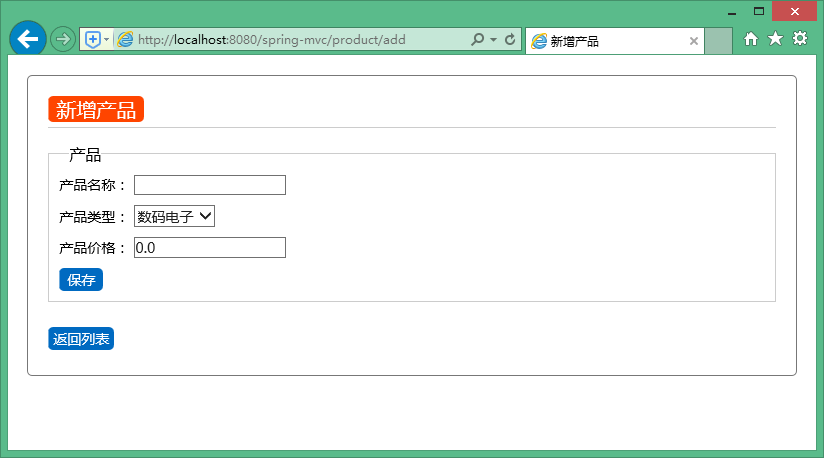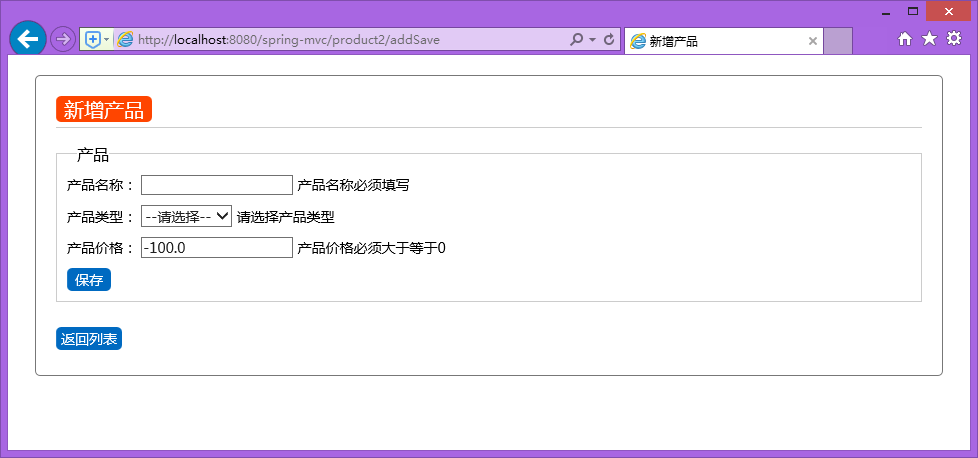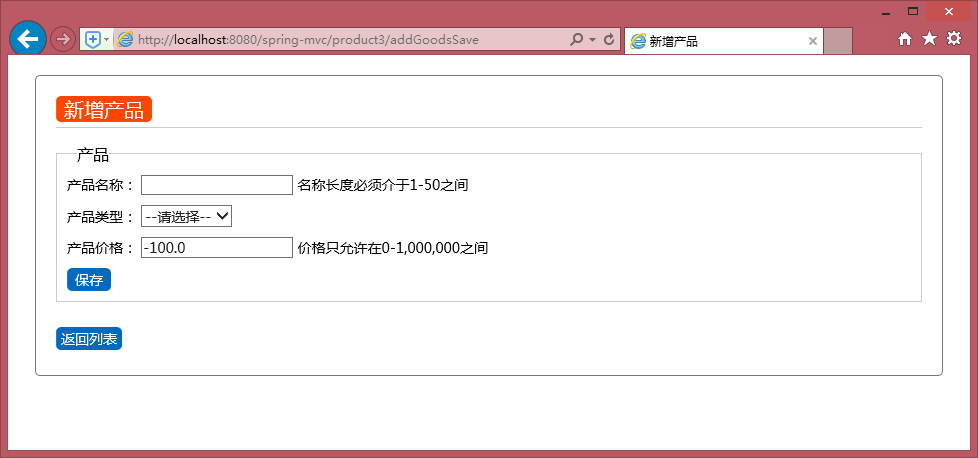Spring MVC验证器
在展示Spring MVC验证器之前,先在前面项目的基础上,通过一个相对综合的示例串联前面学习过的一些知识点,主要实现产品管理管理功能,包含产品的添加,删除,修改,查询,多删除功能。
一、综合示例
1. 新建POJO实体(entity)
在包org.spring.mvc.model包中新增产品类型类ProductType:
package org.spring.mvc.model;
import java.io.Serializable;
/**
* 产品类型
*/
public class ProductType implements Serializable {
private static final long serialVersionUID = 2L;
// 编号
private int id;
// 名称
private String name;
public ProductType() {
}
public ProductType(int id, String name) {
super();
this.id = id;
this.name = name;
}
public int getId() {
return id;
}
public void setId(int id) {
this.id = id;
}
public String getName() {
return name;
}
public void setName(String name) {
this.name = name;
}
@Override
public String toString() {
return "编号:" + this.getId() + ",名称:" + this.getName();
}
}
修改产品POJO类Product:
package org.spring.mvc.model;
import java.io.Serializable;
/**
* 产品
*/
public class Product implements Serializable {
private static final long serialVersionUID = 1L;
// 编号
private int id;
// 名称
private String name;
// 价格
private double price;
// 产品类型
private ProductType productType;
public Product() {
productType = new ProductType();
}
public Product(String name, double price) {
super();
this.name = name;
this.price = price;
}
public Product(int id, String name, double price) {
super();
this.id = id;
this.name = name;
this.price = price;
}
public Product(int id, String name, double price, ProductType type) {
super();
this.id = id;
this.name = name;
this.price = price;
this.productType = type;
}
public int getId() {
return id;
}
public void setId(int id) {
this.id = id;
}
public String getName() {
return name;
}
public void setName(String name) {
this.name = name;
}
public double getPrice() {
return price;
}
public void setPrice(double price) {
this.price = price;
}
public ProductType getProductType() {
return productType;
}
public void setProductType(ProductType productType) {
this.productType = productType;
}
@Override
public String toString() {
return "编号(id):" + this.getId() + ",名称(name):" + this.getName() + ",价格(price):" + this.getPrice() + ",类型(productType.Name):" + this.getProductType().getName();
}
}
2. 新建业务层(Service)
在包org.spring.mvc.service中创建产品类型服务接口ProductTypeService:
package org.spring.mvc.service;
import java.util.List;
import org.spring.mvc.model.ProductType;
/**
* 产品类型服务
*
*/
public interface ProductTypeService {
/**
* 根据产品类型编号获得产品类型对象
*/
public ProductType getProductTypeById(int id);
/**
* 获得所有的产品类型
*/
public List<ProductType> getAllProductTypes();
}
创建产品类型服务接口ProductTypeService的实现类ProductTypeServiceImpl:
package org.spring.mvc.service;
import java.util.ArrayList;
import java.util.List;
import org.spring.mvc.model.ProductType;
import org.springframework.stereotype.Service;
@Service
public class ProductTypeServiceImpl implements ProductTypeService {
private static List<ProductType> productTypes;
static {
productTypes = new ArrayList<ProductType>();
productTypes.add(new ProductType(11, "数码电子"));
productTypes.add(new ProductType(21, "鞋帽服饰"));
productTypes.add(new ProductType(31, "图书音像"));
productTypes.add(new ProductType(41, "五金家电"));
productTypes.add(new ProductType(51, "生鲜水果"));
}
@Override
public ProductType getProductTypeById(int id) {
for (ProductType productType : productTypes) {
if (productType.getId() == id) {
return productType;
}
}
return null;
}
@Override
public List<ProductType> getAllProductTypes() {
return productTypes;
}
}
在包org.spring.mvc.service中创建产品服务接口ProductService:
package org.spring.mvc.service;
import java.util.List;
import org.spring.mvc.model.Product;
public interface ProductService {
/**
* 获得所有的产品
*/
List<Product> getAllProducts();
/**
* 通过编号获得产品
*/
Product getProductById(int id);
/**
* 通过名称获得产品
*/
List<Product> getProductsByName(String productName);
/**
* 新增产品对象
*/
void addProduct(Product enttiy) throws Exception;
/**
* 更新产品对象
*/
public void updateProduct(Product entity) throws Exception;
/**
* 删除产品对象
*/
void deleteProduct(int id);
/**
* 多删除产品对象
*/
void deletesProduct(int[] ids);
}
创建产品服务接口ProductService的实现类ProductServiceImpl:
package org.spring.mvc.service;
import java.util.ArrayList;
import java.util.List;
import org.spring.mvc.model.Product;
import org.springframework.stereotype.Service;
@Service
public class ProductServiceImpl implements ProductService {
private static List<Product> products;
static {
ProductTypeService productTypeService = new ProductTypeServiceImpl();
products = new ArrayList<Product>();
products.add(new Product(198, "Huwei P8", 4985.6, productTypeService.getProductTypeById(11)));
products.add(new Product(298, "李宁运动鞋", 498.56, productTypeService.getProductTypeById(21)));
products.add(new Product(398, "Spring MVC权威指南", 49.856,productTypeService.getProductTypeById(31)));
products.add(new Product(498, "山东国光苹果", 4.9856, productTypeService.getProductTypeById(51)));
products.add(new Product(598, "8开门超级大冰箱", 49856.1, productTypeService.getProductTypeById(41)));
}
/**
* 获得所有的产品
*/
@Override
public List<Product> getAllProducts() {
return products;
}
/**
* 通过编号获得产品
*/
@Override
public Product getProductById(int id) {
for (Product product : products) {
if (product.getId() == id) {
return product;
}
}
return null;
}
/**
* 通过名称获得产品名称
*/
@Override
public List<Product> getProductsByName(String productName) {
if (productName == null || productName.equals("")) {
return getAllProducts();
}
List<Product> result = new ArrayList<Product>();
for (Product product : products) {
if (product.getName().contains(productName)) {
result.add(product);
}
}
return result;
}
/**
* 新增
*
* @throws Exception
*/
@Override
public void addProduct(Product entity) throws Exception {
if (entity.getName() == null || entity.getName().equals("")) {
throw new Exception("产品名称必须填写");
}
if (products.size() > 0) {
entity.setId(products.get(products.size() - 1).getId() + 1);
} else {
entity.setId(1);
}
products.add(entity);
}
/**
* 更新
*/
public void updateProduct(Product entity) throws Exception {
if (entity.getPrice() < 0) {
throw new Exception("价格必须大于0");
}
Product source = getProductById(entity.getId());
source.setName(entity.getName());
source.setPrice(entity.getPrice());
source.setProductType(entity.getProductType());
}
/**
* 删除
*/
@Override
public void deleteProduct(int id) {
products.remove(getProductById(id));
}
/**
* 多删除
*/
@Override
public void deletesProduct(int[] ids) {
for (int id : ids) {
deleteProduct(id);
}
}
}
3. 实现展示、查询、删除与多删除功能
在org.spring.mvc.controller包中定义一个名为ProductController的控制器
index请求处理方法在路径映射注解@RequestMapping中也并未指定value值是让该action为默认action,所有当我们访问系统时这个index就成了欢迎页。
package org.spring.mvc.controller;
import org.spring.mvc.model.Product;
import org.spring.mvc.service.ProductService;
import org.spring.mvc.service.ProductTypeService;
import org.springframework.beans.factory.annotation.Autowired;
import org.springframework.stereotype.Controller;
import org.springframework.ui.Model;
import org.springframework.web.bind.annotation.PathVariable;
import org.springframework.web.bind.annotation.RequestMapping;
import org.springframework.web.bind.annotation.RequestParam;
@Controller
@RequestMapping("/product")
public class ProductController {
@Autowired
ProductService productService;
@Autowired
ProductTypeService productTypeService;
/**
* 展示与搜索
*/
@RequestMapping
public String index(Model model, String searchKey) {
model.addAttribute("products", productService.getProductsByName(searchKey));
model.addAttribute("searchKey", searchKey);
return "product/index";
}
/**
* 删除,id为路径变量
*/
@RequestMapping("/delete/{id}")
public String delete(@PathVariable int id) {
productService.deleteProduct(id);
return "redirect:/product";
}
/**
* 多删除,ids的值为多个id参数组成
*/
@RequestMapping("/deletes")
public String deletes(@RequestParam("id") int[] ids) {
productService.deletesProduct(ids);
return "redirect:/product";
}
}
定义所有页面风格用的main.css样式:
@CHARSET "UTF-8";
* {
margin: 0;
padding: 0;
font-family: microsoft yahei;
font-size: 14px;
}
body {
padding-top: 20px;
}
.main {
width: 90%;
margin: 0 auto;
border: 1px solid #777;
padding: 20px;
border-radius: 5px;
}
.main .title {
font-size: 20px;
font-weight: normal;
border-bottom: 1px solid #ccc;
margin-bottom: 15px;
padding-bottom: 5px;
color: #006ac1;
}
.main .title span {
display: inline-block;
font-size: 20px;
color: #fff;
padding: 0 8px;
background: orangered;
border-radius: 5px;
}
a {
color: #006ac1;
text-decoration: none;
}
a:hover {
color: orangered;
}
.tab td, .tab, .tab th {
border: 1px solid #777;
border-collapse: collapse;
}
.tab td, .tab th {
line-height: 26px;
height: 26px;
padding-left: 5px;
}
.abtn {
display: inline-block;
height: 18px;
line-height: 18px;
background: #006ac1;
color: #fff;
padding: 0 5px;
border-radius: 5px;
}
.btn {
height: 18px;
line-height: 18px;
background: #006ac1;
color: #fff;
padding: 0 8px;
border: 0;
border-radius: 5px;
}
.abtn:hover, .btn:hover {
background: orangered;
color: #fff;
}
p {
padding: 5px 0;
}
fieldset {
border: 1px solid #ccc;
padding: 5px 10px;
}
fieldset legend {
margin-left: 10px;
font-size: 16px;
}
a.out, input.out {
height: 23px;
line-height: 23px;
}
form {
margin: 10px 0;
}
在view目录下新建目录product,在product目录下新建一个视图index.jsp:
<%@ page language="java" contentType="text/html; charset=UTF-8" pageEncoding="UTF-8"%>
<%@taglib prefix="c" uri="http://java.sun.com/jsp/jstl/core"%>
<%@taglib prefix="fmt" uri="http://java.sun.com/jsp/jstl/fmt"%>
<!DOCTYPE html>
<html>
<head>
<meta http-equiv="Content-Type" content="text/html; charset=UTF-8">
<link href="<c:url value="/styles/main.css"/>" type="text/css" rel="stylesheet" />
<title>产品管理</title>
</head>
<body>
<div class="main">
<h2 class="title">
<span>产品管理</span>
</h2>
<form method="get">
名称:<input type="text" name="searchKey" value="${searchKey}" /> <input type="submit" value="搜索" class="btn out" />
</form>
<form action="product/deletes" method="post">
<table border="1" width="100%" class="tab">
<tr>
<th><input type="checkbox" id="chbAll"></th>
<th>编号</th>
<th>产品名</th>
<th>价格</th>
<th>类型</th>
<th>操作</th>
</tr>
<c:forEach var="product" items="${products}">
<tr>
<th><input type="checkbox" name="id" value="${product.id}"></th>
<td>${product.id}</td>
<td>${product.name}</td>
<td>${product.price}</td>
<td>${product.productType.name}</td>
<td><a href="product/delete/${product.id}" class="abtn">删除</a> <a href="product/edit/${product.id}" class="abtn">编辑</a></td>
</tr>
</c:forEach>
</table>
<p style="color: red">${message}</p>
<p>
<a href="product/add" class="abtn out">添加</a> <input type="submit" value="删除选择项" class="btn out" />
</p>
<script type="text/javascript" src="<c:url value="/scripts/jQuery1.11.3/jquery-1.11.3.min.js"/>"></script>
</form>
</div>
</body>
</html>
访问路径:http://localhost:8080/spring-mvc/product,运行结果如图1所示:
 图 1
图 14. 新增产品
在ProductController控制器中添加两个Action,一个用于渲染添加页面,另一个用于响应保存功能:
/**
* 新增,渲染出新增界面
*/
@RequestMapping("/add")
public String add(Model model) {
// 与form绑定的模型
model.addAttribute("product", new Product());
// 用于生成下拉列表
model.addAttribute("productTypes", productTypeService.getAllProductTypes());
return "product/add";
}
/**
* 新增保存,如果新增成功转回列表页,如果失败回新增页,保持页面数据
*/
@RequestMapping("/addSave")
public String addSave(Model model, Product product) {
try {
// 根据类型的编号获得类型对象
product.setProductType(productTypeService.getProductTypeById(product.getProductType().getId()));
productService.addProduct(product);
return "redirect:/product";
} catch (Exception exp) {
// 与form绑定的模型
model.addAttribute("product", product);
// 用于生成下拉列表
model.addAttribute("productTypes", productTypeService.getAllProductTypes());
// 错误消息
model.addAttribute("message", exp.getMessage());
return "product/add";
}
}
在view/product目录下新增视图add.jsp页面:
<%@ page language="java" contentType="text/html; charset=UTF-8" pageEncoding="UTF-8"%>
<%@taglib prefix="c" uri="http://java.sun.com/jsp/jstl/core"%>
<%@taglib prefix="form" uri="http://www.springframework.org/tags/form"%>
<!DOCTYPE html>
<html>
<head>
<meta http-equiv="Content-Type" content="text/html;charset=UTF-8">
<link href="<c:url value="/styles/main.css"/>" type="text/css" rel="stylesheet" />
<title>新增产品</title>
</head>
<body>
<div class="main">
<h2 class="title">
<span>新增产品</span>
</h2>
<form:form action="addSave" modelAttribute="product">
<fieldset>
<legend>产品</legend>
<p>
<label for="name">产品名称:</label>
<form:input path="name" />
</p>
<p>
<label for="title">产品类型:</label>
<form:select path="productType.id" items="${productTypes}" itemLabel="name" itemValue="id">
</form:select>
</p>
<p>
<label for="price">产品价格:</label>
<form:input path="price" />
</p>
<p>
<input type="submit" value="保存" class="btn out">
</p>
</fieldset>
</form:form>
<p style="color: red">${message}</p>
<p>
<a href="<c:url value="/product" />" class="abtn out">返回列表</a>
</p>
</div>
</body>
</html>
点击添加按钮,运行结果如图2所示:
 图 2
图 25. 编辑产品
在ProductController控制器中添加两个Action,一个用于渲染编辑页面,根据要编辑的产品编号获得产品对象,另一个用于响应保存功能。
/**
* 编辑,渲染出编辑界面,路径变量id是用户要编辑的产品编号
*/
@RequestMapping("/edit/{id}")
public String edit(Model model, @PathVariable int id) {
// 与form绑定的模型
model.addAttribute("product", productService.getProductById(id));
// 用于生成下拉列表
model.addAttribute("productTypes", productTypeService.getAllProductTypes());
return "product/edit";
}
/**
* 编辑后保存,如果更新成功转回列表页,如果失败回编辑页,保持页面数据
*/
@RequestMapping("/editSave")
public String editSave(Model model, Product product) {
try {
// 根据类型的编号获得类型对象
product.setProductType(productTypeService.getProductTypeById(product.getProductType().getId()));
productService.updateProduct(product);
return "redirect:/product";
} catch (Exception exp) {
// 与form绑定的模型
model.addAttribute("product", product);
// 用于生成下拉列表
model.addAttribute("productTypes", productTypeService.getAllProductTypes());
// 错误消息
model.addAttribute("message", exp.getMessage());
return "product/edit";
}
}
在view/product目录下新增视图edit.jsp页面:
<%@ page language="java" contentType="text/html; charset=UTF-8" pageEncoding="UTF-8"%>
<%@taglib prefix="c" uri="http://java.sun.com/jsp/jstl/core"%>
<%@taglib prefix="form" uri="http://www.springframework.org/tags/form" %>
<!DOCTYPE html>
<html>
<head>
<meta http-equiv="Content-Type" content="text/html;charset=UTF-8">
<link href="<c:url value="/styles/main.css" />" type="text/css" rel="stylesheet" />
<title>编辑产品</title>
</head>
<body>
<div class="main">
<h2 class="title"><span>编辑产品</span></h2>
<form:form action="../editSave" modelAttribute="product">
<fieldset>
<legend>产品</legend>
<p>
<label for="name">产品名称:</label>
<form:input path="name"/>
</p>
<p>
<label for="title">产品类型:</label>
<form:select path="productType.id" items="${productTypes}" itemLabel="name" itemValue="id">
</form:select>
</p>
<p>
<label for="price">产品价格:</label>
<form:input path="price"/>
</p>
<p>
<form:hidden path="id"/>
<input type="submit" value="保存" class="btn out">
</p>
</fieldset>
</form:form>
<p style="color: red">${message}</p>
<p>
<a href="<c:url value="/product" />" class="abtn out">返回列表</a>
</p>
</div>
</body>
</html>
点击编辑按钮,运行结果如图3所示:
 图 3
图 3二、Spring MVC验证器
Spring MVC不仅是在架构上改变了项目,使代码变得可复用、可维护与可扩展,其实在功能上也加强了不少。验证与文件上传是许多项目中不可缺少的一部分。在项目中验证非常重要,首先是安全性考虑,如防止注入攻击,XSS等;其次还可以确保数据的完整性,如输入的格式,内容,长度,大小等。Spring MVC可以使用验证器Validator与JSR303完成后台验证功能。这里也会介绍方便的前端验证方法。
1. Validator验证器
Spring MVC Validator验证器是一个接口,通过实现该接口可以定义对实体对象的验证。该接口如下所示:
package org.springframework.validation;
/**
* Spring MVC内置的验证器接口
*/
public interface Validator {
/**
* 是否可以验证该类型
*/
boolean supports(Class<?> clazz);
/**
* 执行验证 target表示要验证的对象 error表示错误信息
*/
void validate(Object target, Errors errors);
}
(1) 定义验证器
package org.spring.mvc.model;
import org.springframework.validation.Errors;
import org.springframework.validation.ValidationUtils;
import org.springframework.validation.Validator;
/**
* 产品验证器
*
*/
public class ProductValidator implements Validator {
/**
* 当前验证器可以验证的类型
*/
@Override
public boolean supports(Class<?> clazz) {
return Product.class.isAssignableFrom(clazz);
}
/**
* 执行校验
*/
@Override
public void validate(Object target, Errors errors) {
// 将要验证的对象转换成Product类型
Product entity = (Product) target;
// 如果产品名称为空或为空格,使用工具类
ValidationUtils.rejectIfEmptyOrWhitespace(errors, "name", "required", "产品名称必须填写");
// 价格,手动判断
if (entity.getPrice() < 0) {
errors.rejectValue("price", "product.price.gtZero", "产品价格必须大于等于0");
}
// 产品类型必须选择
if (entity.getProductType().getId() == 0) {
errors.rejectValue("productType.id", "product.productType.id.required", "请选择产品类型");
}
}
}
ValidationUtils是一个工具类,中间有一些方可以用于判断内容是否有误。
(2) 执行校验
/**
* 新增保存,如果新增成功转回列表页,如果失败回新增页,保持页面数据
*
* @param model
* @param product
* @return
*/
@RequestMapping("/addSave")
public String addSave(Model model, Product product, BindingResult bindingResult) {
// 创建一个产品验证器
ProductValidator validator = new ProductValidator();
// 执行验证,将验证的结果给bindingResult,该类型继承Errors
validator.validate(product, bindingResult);
// 获得所有的字段错误信息,非必要
for (FieldError fielderror : bindingResult.getFieldErrors()) {
System.out.println(fielderror.getField() + "," + fielderror.getCode() + "," + fielderror.getDefaultMessage());
}
try {
// 是否存在错误,如果没有,执行添加
if (!bindingResult.hasErrors()) {
// 根据类型的编号获得类型对象
product.setProductType(productTypeService.getProductTypeById(product.getProductType().getId()));
productService.addProduct(product);
return "redirect:/product2";
} else {
// 与form绑定的模型
model.addAttribute("product", product);
// 用于生成下拉列表
model.addAttribute("productTypes", productTypeService.getAllProductTypes());
return "product2/add";
}
} catch (Exception exp) {
// 与form绑定的模型
model.addAttribute("product", product);
// 用于生成下拉列表
model.addAttribute("productTypes", productTypeService.getAllProductTypes());
// 错误消息
model.addAttribute("message", exp.getMessage());
return "product2/add";
}
}
注意在参数中增加了一个BindingResult类型的对象,该类型继承自Errors,获得绑定结果,承载错误信息,该对象中有一些方法可以获得完整的错误信息,可以使用hasErrors方法判断是否产生了错误。
(4) 在UI中添加错误标签
<%@ page language="java" contentType="text/html; charset=UTF-8" pageEncoding="UTF-8"%>
<%@taglib prefix="c" uri="http://java.sun.com/jsp/jstl/core"%>
<%@taglib prefix="form" uri="http://www.springframework.org/tags/form" %>
<!DOCTYPE html>
<html>
<head>
<meta http-equiv="Content-Type" content="text/html;charset=UTF-8">
<link href="<c:url value="/styles/main.css"/>" type="text/css" rel="stylesheet" />
<title>新增产品</title>
</head>
<body>
<div class="main">
<h2 class="title"><span>新增产品</span></h2>
<form:form action="addSave" modelAttribute="product">
<fieldset>
<legend>产品</legend>
<p>
<label for="name">产品名称:</label>
<form:input path="name"/>
<form:errors path="name" cssClass="error"></form:errors>
</p>
<p>
<label for="title">产品类型:</label>
<form:select path="productType.id">
<form:option value="0">--请选择--</form:option>
<form:options items="${productTypes}" itemLabel="name" itemValue="id"/>
</form:select>
<form:errors path="productType.id" cssClass="error"></form:errors>
</p>
<p>
<label for="price">产品价格:</label>
<form:input path="price"/>
<form:errors path="price" cssClass="error"></form:errors>
</p>
<p>
<input type="submit" value="保存" class="btn out">
</p>
</fieldset>
</form:form>
<p style="color: red">${message}</p>
<p>
<a href="<c:url value="/product2" />" class="abtn out">返回列表</a>
</p>
</div>
</body>
</html>
(5) 测试运行
访问路径:http://localhost:8080/spring-mvc/product2,运行结果如图4所示:
 图 4
图 4控制台输出:
name,required,产品名称必须填写
price,product.price.gtZero,产品价格必须大于等于0
productType.id,product.productType.id.required,请选择产品类型
2. JSR303验证器
JSR是Java Specification Requests的缩写,意思是Java规范提案,是指向JCP(Java Community Process)提出新增一个标准化技术规范的正式请求。任何人都可以提交JSR,以向Java平台增添新的API和服务。JSR已成为Java界的一个重要标准。JSR303只是一个标准,是一个数据验证规范,对这个标准的实现有:hibernate-validator,Apache BVal等。这里我们使用hibernate-validator实现校验。
(1) 添加hibernate-validator依赖
修改配置pom.xml配置文件,添加依赖。
<!--JSR303 Bean校验-->
<dependency>
<groupId>org.hibernate</groupId>
<artifactId>hibernate-validator</artifactId>
<version>5.2.2.Final</version>
</dependency>
(2) 注解实体类
为Bean的name和price属性设置验证规则:
// 名称
@Size(min=1,max=50,message="名称长度必须介于{2}-{1}之间")
@Pattern(regexp="^[\\w\\u4e00-\\u9fa5]{0,10}$",message="格式错误,必须是字母数字与中文")
private String name;
// 价格
@Range(min=0,max=1000000,message="价格只允许在{2}-{1}之间")
private double price;
常用验证的注解如下所示:
空值检查
- @Null 验证对象是否为null
- @NotNull 验证对象是否不为null, 无法查检长度为0的字符串
- @NotBlank 检查约束字符串是不是Null还有被Trim的长度是否大于0,只对字符串,且会去掉前后空格.
- @NotEmpty 检查约束元素是否为NULL或者是EMPTY.
Booelan检查
- @AssertTrue 验证 Boolean 对象是否为 true
- @AssertFalse 验证 Boolean 对象是否为 false
长度检查
- @Size(min=, max=) 验证对象(Array,Collection,Map,String)长度是否在给定的范围之内
- @Length(min=, max=) Validates that the annotated string is between min and max included.
日期检查
- @Past 验证 Date 和 Calendar 对象是否在当前时间之前
- @Future 验证 Date 和 Calendar 对象是否在当前时间之后
正则
- @Pattern 验证 String 对象是否符合正则表达式的规则
数值检查
建议使用在Stirng,Integer类型,不建议使用在int类型上,因为表单值为“”时无法转换为int,但可以转换为String为””,Integer为null
- @Min 验证 Number 和 String 对象是否大等于指定的值
- @Max 验证 Number 和 String 对象是否小等于指定的值
- @DecimalMax 被标注的值必须不大于约束中指定的最大值. 这个约束的参数是一个通过BigDecimal定义的最大值的字符串表示.小数存在精度
- @DecimalMin 被标注的值必须不小于约束中指定的最小值. 这个约束的参数是一个通过BigDecimal定义的最小值的字符串表示.小数存在精度
- @Digits 验证 Number 和 String 的构成是否合法
- @Digits(integer=,fraction=) 验证字符串是否是符合指定格式的数字,interger指定整数精度,fraction指定小数精度。
范围
- @Range(min=, max=) 检查被注解对象的值是否处于min与max之间,闭区间,包含min与max值
- @Range(min=10000,max=50000,message=”必须介于{2}-{1}之间”)
其它注解
- @Valid 递归的对关联对象进行校验, 如果关联对象是个集合或者数组,那么对其中的元素进行递归校验,如果是一个map,则对其中的值部分进行校验.(是否进行递归验证),该注解使用在Action的参数上。
- @CreditCardNumber信用卡验证
- @Email 验证是否是邮件地址,如果为null,不进行验证,算通过验证。
- @ScriptAssert(lang= ,script=, alias=)
- @URL(protocol=,host=, port=,regexp=, flags=)
(3) 注解控制器参数
在需要使用Bean验证的参数对象上注解@Valid,触发验证
@RequestMapping("/addGoodsSave")
public String addSave(Model model, @Valid Product product, BindingResult bindingResult) {
try {
// 是否存在错误,如果没有,执行添加
if (!bindingResult.hasErrors()) {
// 根据类型的编号获得类型对象
product.setProductType(productTypeService.getProductTypeById(product.getProductType().getId()));
productService.addProduct(product);
return "redirect:/product3";
} else {
// 与form绑定的模型
model.addAttribute("product", product);
// 用于生成下拉列表
model.addAttribute("productTypes", productTypeService.getAllProductTypes());
return "product3/addGoods";
}
} catch (Exception exp) {
// 与form绑定的模型
model.addAttribute("product", product);
// 用于生成下拉列表
model.addAttribute("productTypes", productTypeService.getAllProductTypes());
return "product3/addGoods";
}
}
(4) 在UI中添加错误标签
这里与Spring MVC Validator基本一致,在product3目录下新增一个名为addGoods.jsp的页面
<%@ page language="java" contentType="text/html; charset=UTF-8" pageEncoding="UTF-8"%>
<%@taglib prefix="c" uri="http://java.sun.com/jsp/jstl/core"%>
<%@taglib prefix="form" uri="http://www.springframework.org/tags/form"%>
<!DOCTYPE html>
<html>
<head>
<meta http-equiv="Content-Type" content="text/html;charset=UTF-8">
<link href="<c:url value="/styles/main.css" />" type="text/css" rel="stylesheet" />
<title>新增产品</title>
</head>
<body>
<div class="main">
<h2 class="title">
<span>新增产品</span>
</h2>
<form:form action="addGoodsSave" modelAttribute="product">
<fieldset>
<legend>产品</legend>
<p>
<label for="name">产品名称:</label>
<form:input path="name" />
<form:errors path="name" cssClass="error"></form:errors>
</p>
<p>
<label for="title">产品类型:</label>
<form:select path="productType.id">
<form:option value="0">--请选择--</form:option>
<form:options items="${productTypes}" itemLabel="name" itemValue="id" />
</form:select>
<form:errors path="productType.id" cssClass="error"></form:errors>
</p>
<p>
<label for="price">产品价格:</label>
<form:input path="price" />
<form:errors path="price" cssClass="error"></form:errors>
</p>
<p>
<input type="submit" value="保存" class="btn out">
</p>
</fieldset>
</form:form>
<p style="color: red">${message}</p>
<p>
<a href="<c:url value="/product3" />" class="abtn out">返回列表</a>
</p>
</div>
</body>
</html>
(5) 测试运行
访问路径:http://localhost:8080/spring-mvc/product3/addGoodsSave,运行结果如图5所示:
 图 5
图 5(6) 小结
从上面的示例可以看出这种验证更加方便直观,一次定义反复使用,验证在编辑、更新时同样可以使用;另外验证的具体信息可以存放在配置文件中,如message.properties,这样便于国际化与修改。
3. 使用jQuery扩展插件Validate实现前端校验
暂时没看